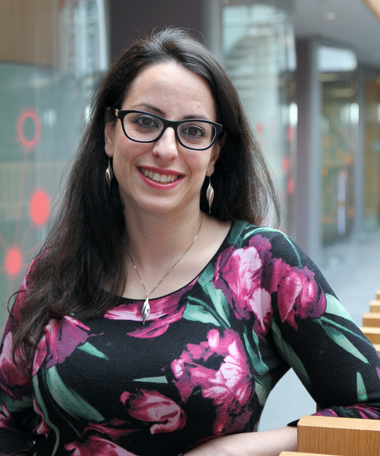Maya GHOUSSAINI - Cambridge - UK
-
On 01 April 2022Amphi Denis Escandefalse false
-
11h30
Open Targets Genetics: An atlas of trait-associated loci to guide therapeutic target identification
Open Targets Genetics: An atlas of trait-associated loci to guide therapeutic target identification
Maya Ghoussaini, PhD
Genetic Analysis Team Leader, Open Targets, Wellcome Sanger Institute
Abstract
The majority of drugs that enter clinical trials fail due to the lack of efficacy. This highlights the need to explore additional sources of evidence to inform drug discovery. In this talk, I will focus on how human genetics can be used to guide therapeutic target identification with a particular focus on translational data from GWAS. I will then discuss Open Targets Genetics, an open resource we developed that integrates genetic (GWAS Catalog, UK Biobank and FinnGen), transcriptomic, proteomic and epigenomic data across many tissues and cell types. The resource also provides systematic fine-mapping and gene prioritisation across 279,116 published human GWAS loci. I will discuss our Machine learning work which enabled us to perform gene prioritisation. In brief, credible set analysis of all published GWAS loci were integrated with functional genomics data (including pathogenicity prediction, colocalisation with molecular quantitative trait loci, genomic distance and chromatin interaction data) to produce locus-to-gene predictive features. A set of 445 gold-standard GWAS loci, for which we are confident of the causal genes, was used to train an XGBoost gradient boosting classifier capable of predicting causal genes at each locus. Our model outperforms a naive distance-based model and prioritised genes were enriched for known approved drug targets. Open Targets Genetics also provides systematic disease-disease and disease-molecular trait colocalisation results across 133 cell types and tissues. These results are publicly available through Open Target Genetics (OTG, http://genetics.opentargets. org), enabling users to prioritize genes at associated loci and assess their potential as drug targets.
Biography
Maya completed a PhD degree in Molecular Genetics at the Pasteur Institute of Lille, France. In 2007, she moved to the Department of Oncology at the University of Cambridge where her research focussed on Genome Wide Association Studies for breast cancer and the identification of genetic variants that increase cancer risk. In 2015, she moved to the Department of Pharmacology at the University of Cambridge where she used genome editing (CRISPR/Cas9) to understand how and why these genetic variants increase breast cancer risk, impact cancer cell behaviour and affect target gene expression. In 2017, she joined the Wellcome Sanger Institute as Genetic Analysis Team Leader within Open Targets. Her team integrates human genetics and functional genomics data to improve target identification and prioritisation. Maya is also a Course Director and a tutor for the Undergraduate Certificate in Genetics at the University of Cambridge.






